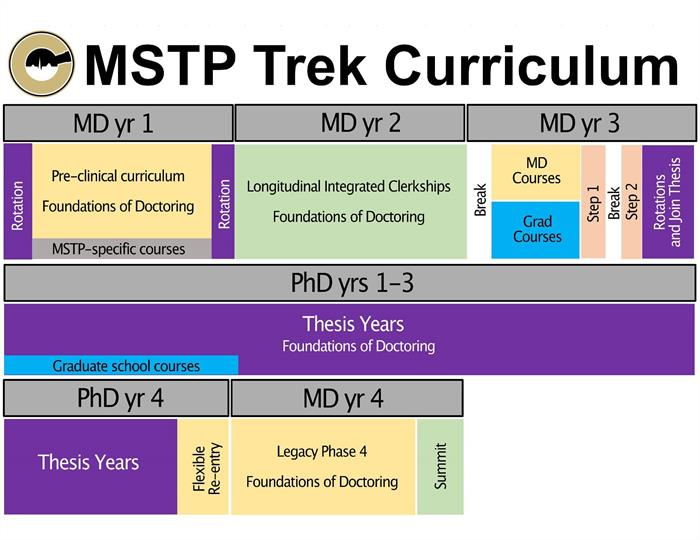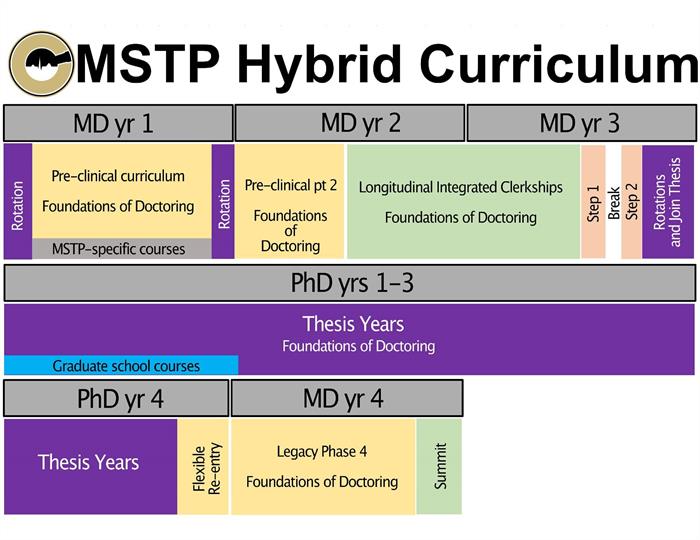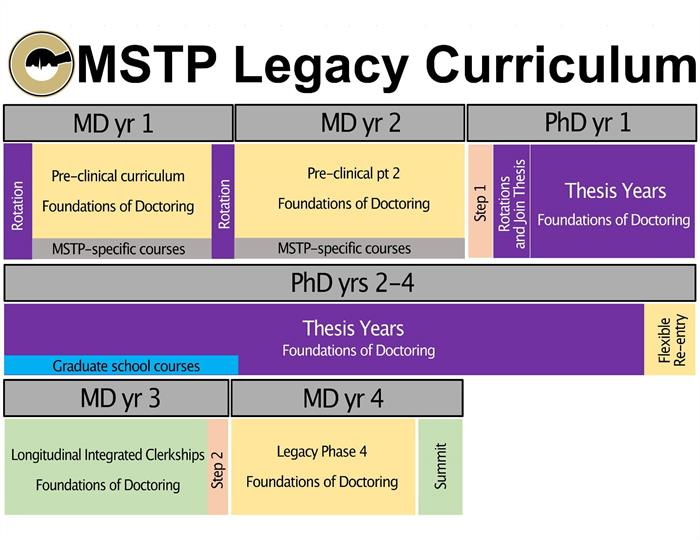At the University of Colorado Anschutz, we provide future physician scientists with the scientific, clinical, and communication skills necessary to develop and effectively deliver state-of-the-art health care to an increasingly diverse population. Students learn through a sequence of interdisciplinary Blocks and Threads that are designed to gradually build student competency in our mission of education, research, clinical care, and community service.
We offer a highly integrated curriculum combining Medical and Graduate School Curricula, USMLE Step Exams 1 and 2, Preliminary Graduate Exam and lab rotations within the first three years (MS1-3), prior to entering a degree-granting graduate program on one of our three campuses: CU Anschutz Medical, CU Boulder, or National Jewish Health.
MSTP does not confer either the MD or PhD degree, but rather we recruit students who seek to complete both degrees. Once they complete all requirements for the PhD, they return to medical school to complete the last year(s) of clinical training.
The MST Program trains combined degree students to become proficient and successful clinicians and investigators who can:
> Demonstrate advanced knowledge of central concepts in the biomedical sciences <
> Understand the current concepts in medicine and their chosen PhD field <
> Read and critically evaluate the scientific literature <
> Communicate effectively through oral presentations at seminars, conferences, and venues <
>Write a competitive application for research funding <
>Develop ancillary skills to obtain positions in a wide range of biomedical venues <
> Become innovators and leaders in their respective fields and careers <
 Over the years, we are always trying to give entering students the best education possible. Our recent curriculum change reflects this commitment. Our new Trek curriculum has been meticulously designed by teams of medical school faculty, administrators, and students, with the goal of training the next generation of leaders, advocates, and innovators in healthcare. The new Trek curriculum is intended to be both competency-based and evidence-based, keeping the curriculum in line with the most up-to-date biomedical and clinical research, and providing students with the knowledge and skillsets to employ complex scientific concepts in the clinical setting. Additionally, the Trek curriculum intends to give students earlier hands-on clinical experiences to begin developing important clinical skills alongside classroom learning. These clinical experiences are designed to be longitudinal and individualized, providing students with the opportunity to get to know and develop relationships with the patients they treat, and additionally, to provide enough flexibility within the curriculum to allow students more opportunities to explore their own interests and refine career path selection. Lastly, in addition to traditional scientific and medical knowledge, the Trek curriculum integrates elements of the social sciences, bioethics, humanities, and health systems science to prepare students for the multifaceted practice of modern healthcare. Incoming MSTP students will be entering into the Trek curriculum for their medical training
Over the years, we are always trying to give entering students the best education possible. Our recent curriculum change reflects this commitment. Our new Trek curriculum has been meticulously designed by teams of medical school faculty, administrators, and students, with the goal of training the next generation of leaders, advocates, and innovators in healthcare. The new Trek curriculum is intended to be both competency-based and evidence-based, keeping the curriculum in line with the most up-to-date biomedical and clinical research, and providing students with the knowledge and skillsets to employ complex scientific concepts in the clinical setting. Additionally, the Trek curriculum intends to give students earlier hands-on clinical experiences to begin developing important clinical skills alongside classroom learning. These clinical experiences are designed to be longitudinal and individualized, providing students with the opportunity to get to know and develop relationships with the patients they treat, and additionally, to provide enough flexibility within the curriculum to allow students more opportunities to explore their own interests and refine career path selection. Lastly, in addition to traditional scientific and medical knowledge, the Trek curriculum integrates elements of the social sciences, bioethics, humanities, and health systems science to prepare students for the multifaceted practice of modern healthcare. Incoming MSTP students will be entering into the Trek curriculum for their medical training
Check out more details of the Trek Curriculum



ed6894e6302864d9a5bfff0a001ce385.jpg?sfvrsn=2b40f0ba_0&MaxWidth=400&MaxHeight=400&ScaleUp=false&Quality=High&Method=ResizeFitToAreaArguments&Signature=CC617D4551B15ABD5514310236D61E4D94A3B6A3)
